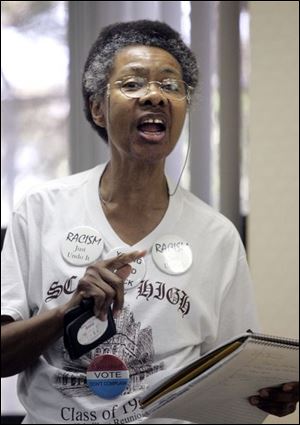
Activist: TARTA's transfer halt tough on poor
7/31/2008
Smith
TARTA's plan to abolish 10-cent transfers "discriminates" against poor people, according to a transit activist who was one of just a handful of speakers at a brief public hearing about proposed transit authority fare changes.
Eliminating transfers is "not right" and particularly will be hard on families who ride the buses together, said Shirley Smith, who later held a "Stop Punishing the Poor" sign up for the cameras while TV reporters interviewed James Gee, the Toledo Area Regional Transit Authority's general manager.
Requiring a fresh fare for every leg of a bus trip and eliminating the fare discount on Call-A-Ride routes are the two main elements of a "fare-structure" change transit authority staff has developed to combat soaring fuel prices.
While TARTA's base fare of $1 would not change, it would apply to all routes, including the suburban Call-A-Rides that now cost 60 cents. Senior and disabled Call-A-Ride passengers would pay 50 cents, up from 30 cents.
But eliminating the transfer fare would make trips requiring bus connections considerably more expensive. A two-bus ride that now costs $1.10 would go to $2; a round-trip for the same trek would rise from $2.20 to $4.
The fare changes go to the transit authority's board of trustees, which meets Aug. 7. If approved, Mr. Gee said, the changes will take effect Sept. 1.
Weekly passes will continue to cost $10, and monthly passes $40, and Mr. Gee said transit officials expect pass sales will increase if transfers are eliminated.
"We would expect most folks would migrate to the weekly or monthly pass," he said.
Ms. Smith immediately added, "If they can afford it."
Other speakers only had questions about how the revised fare structure will affect seniors or disabled people.
Mr. Gee said their 50 percent discounts still will apply and that the 10-ride tickets
TARTA issues will still be honored but no longer sold once the half-price weekly passes are available.
Nutrition-program passes issued by the Area Office on Aging of Northwestern Ohio will continue to be valid, he said.
"I commend you on doing everything that you can with limited resources," Michele Shepler, community travel specialist for the Lucas County Board of Mental Retardation and Developmental Disabilities, told Mr. Gee.
Ms. Smith said she expects a larger turnout of people harmed by the plan to eliminate transfers at the TARTA trustees' meeting.
Despite considerable media coverage, Ms. Smith insisted many of those affected were unaware of the changes or of the hearing yesterday.
The fare hearing yesterday followed by six days TARTA hearings on route cuts and consolidations also intended to cut transit authority costs.
Those changes, which include elimination of off-peak express service between Westfield Franklin Park and downtown Toledo, truncation of the No. 3 Crosstown route, and realignment of numerous other routes, are scheduled to take effect Aug. 24.
TARTA board approval is not needed for route changes.
TARTA's fuel costs are up this year by two-thirds over last year, Mr. Gee said. While ridership also has increased because of high fuel prices, that 7 to 8 percent gain "is not nearly enough to offset the price of diesel," he said.
Mr. Gee said he expects raising the Call-A-Ride fare to produce about $40,000 in additional revenue.
The revenue benefit of eliminating transfers hasn't been calculated, he said, because TARTA is unsure how many riders will switch to using passes.
During an interview earlier this month, the transit manager added that eliminating paper transfers also will relieve drivers of having to police the improper use of transfers, which some riders try to use to avoid paying full fares for later trips.
Contact David Patch at:
dpatch@theblade.com
or 419-724-6094.